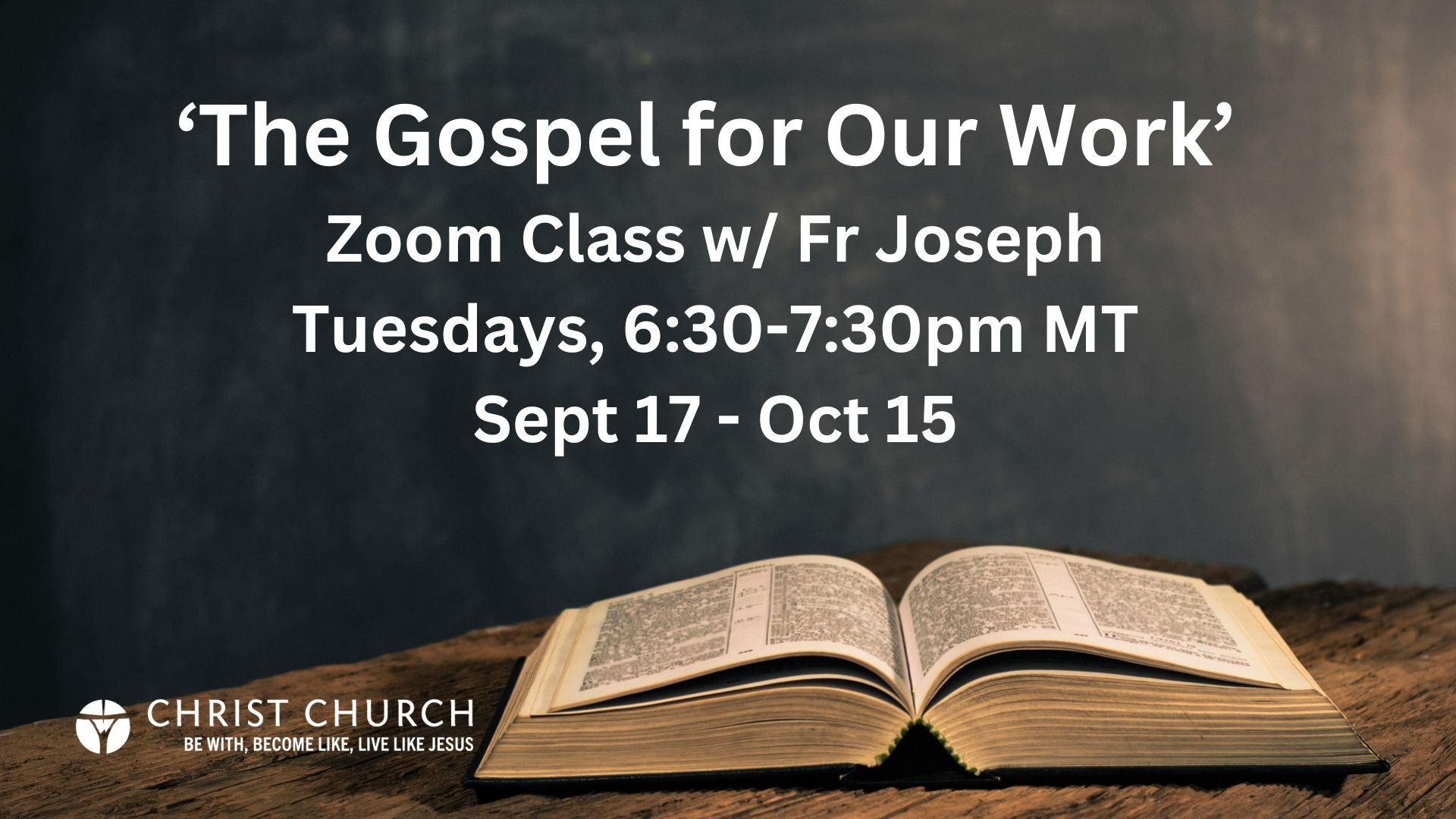Want to delve deeper into ‘redeeming work’?
Join Fr Joseph for a 5-week course––“The Gospel for Our Work”––from the Denver Institute for Faith & Work.
Featuring short lectures from Dr Ryan Tafilowski (Assistant Professor of Theology, Denver Seminary), followed by in-depth discussion, this class will help us explore the grand narrative of creation, fall, redemption, and consummation as it unfolds across the pages of scripture.
“If our understanding of salvation means that we’re simply waiting to go be with God in heaven,” notes Dr Tafilowski, “then the Gospel doesn’t have much to say about our regular workdays in the meantime. If, on the other hand, we come to a broader understanding of the Gospel, we can open up new ways to engage our work redemptively.”
Register below for the Zoom link to join the weekly lecture + discussion.
Can’t make the Tuesday Zooms?
Access the lectures + discussion questions to watch on your own time or with your small group via the Denver Institute’s Faith & Work Classroom.
Dr Ryan Tafilowski
Ryan Tafilowski is assistant professor of theology at Denver Seminary and lead pastor of Foothills Fellowship Church in Denver. He holds a PhD in systematic theology from the University of Edinburgh and has served as theologian-in-residence for Denver Institute for Faith & Work. He is the author of "Virtue and Vice at Work" and co-author of "Faithful Work: In the Daily Grind with God and for Others.”
SCHEDULE
Week 1 (Tue Sept 17): “A Broader Gospel”
What does the gospel have to do with spreadsheets and invoices and stocking office supplies? What does the gospel have to say to me as I stare blankly at my computer while the workday drags on? I didn’t have much of an answer, since I had basically been thinking of the gospel as a two-chapter story: Chapter 1 - Humans are sinners who are separated from God, Chapter 2 - Jesus died for our sins so that we can go to heaven to be with God when we die. But what happens in the meantime? This two-chapter story isn’t untrue—far from it—but it’s not the whole truth; it’s only part of what the Bible means by “the gospel.” What if there were more chapters in the gospel story? What if there were a way to find where our work fits into God’s grand mission to reconcile all things–not just individual sinners–to himself?
Week 2 (Tue Sept 24): “Act 1 - Creation”
The biblical creation accounts depict a world which is the work of a good and wise Creator who shows himself to be collaborative in nature, sharing himself and his work with the only creatures who bear his image, human beings (Gen. 1:28–31; 2:15–25). Significantly, we are told that work predates the fall into sin and death, which shows that work is one of the original goods of creation. The fundamental goodness of work shows up most explicitly in the cultural mandate, in which God commissions human beings to care for creation and make it flourish (Gen. 2:15). In this regard, to be a human being is to be a tasked creature—drawn into God’s dynamic work of creation and care for what he has made and responsible to God for our work.
Week 3 (Tue Oct 1): “Act 2 - Fall”
The event known as the Fall—a cataclysmic rebellion against God that plunged the entire created order into a state of disarray and bondage (Gen. 3–11; Rom. 8:19–23)—disrupted the harmoy of God’s good creation on multiple levels. The Fall and its implications are both personal and cosmic in scope, tainting all of our key relationships: our relationship to our true selves (psychological), one another (social), systems and structures (systemic), the created order (ecological), and ultimately our relationship to God (theological). This means that our daily work is both fallen and falling, and we must seek to fulfill our vocations within systems, industries, economies, cities, states, and nations that are all twisted and warped by sin.
Week 4 (Tue Oct 8): “Act 3 - Redemption”
So, all human life—including all human work—exists in the shadow of the Fall, what David Bently Hart has called “the long melancholy aftermath of a primordial catastrophe.” But as the New Testament tells it, God has taken radical and decisive action in the life, death, resurrection, and ascension of Jesus Christ to “reconcile all things to himself, whether in heaven or on earth” (Col. 1:20). The Fall is both personal and cosmic, but so is the cure. Once we recognize that, we’ll discover renewed purpose for our work. With a broader vision of redemption in mind, our work is no longer an instrumental means to an end, but in a limited sense an end in itself. Our work is not the answer to the curse that haunts creation, but it is one of the ways that God invites his people to join in his mission to “gather up all things” into himself (Eph. 1:10).
Week 5 (Tue Oct 15): “Act 4 - Consummation”
It is central to the Bible’s main storyline that God intends to redeem and restore his fallen creation, not abandon it. So, contrary to some popular misunderstandings of the end times, Jesus Christ is not rescuing us from the world, he is rescuing us for the sake of the world. Revelation 21–22 depicts New Heavens and a New Earth, where God has finally re-integrated our key relationships, including systems and structures, which have been pulled apart and twisted by sin and death. But here’s the kicker: the New Testament makes the bold claim that it is possible for God’s people, by the power of the Holy Spirit, to live in such a way that not only anticipates God’s future when all things will be made new, but to live in such a way that actually participates in this future, which Christians call the Kingdom of God. The challenge is to imagine how our work might serve as a sign and a foretaste of the Kingdom.


